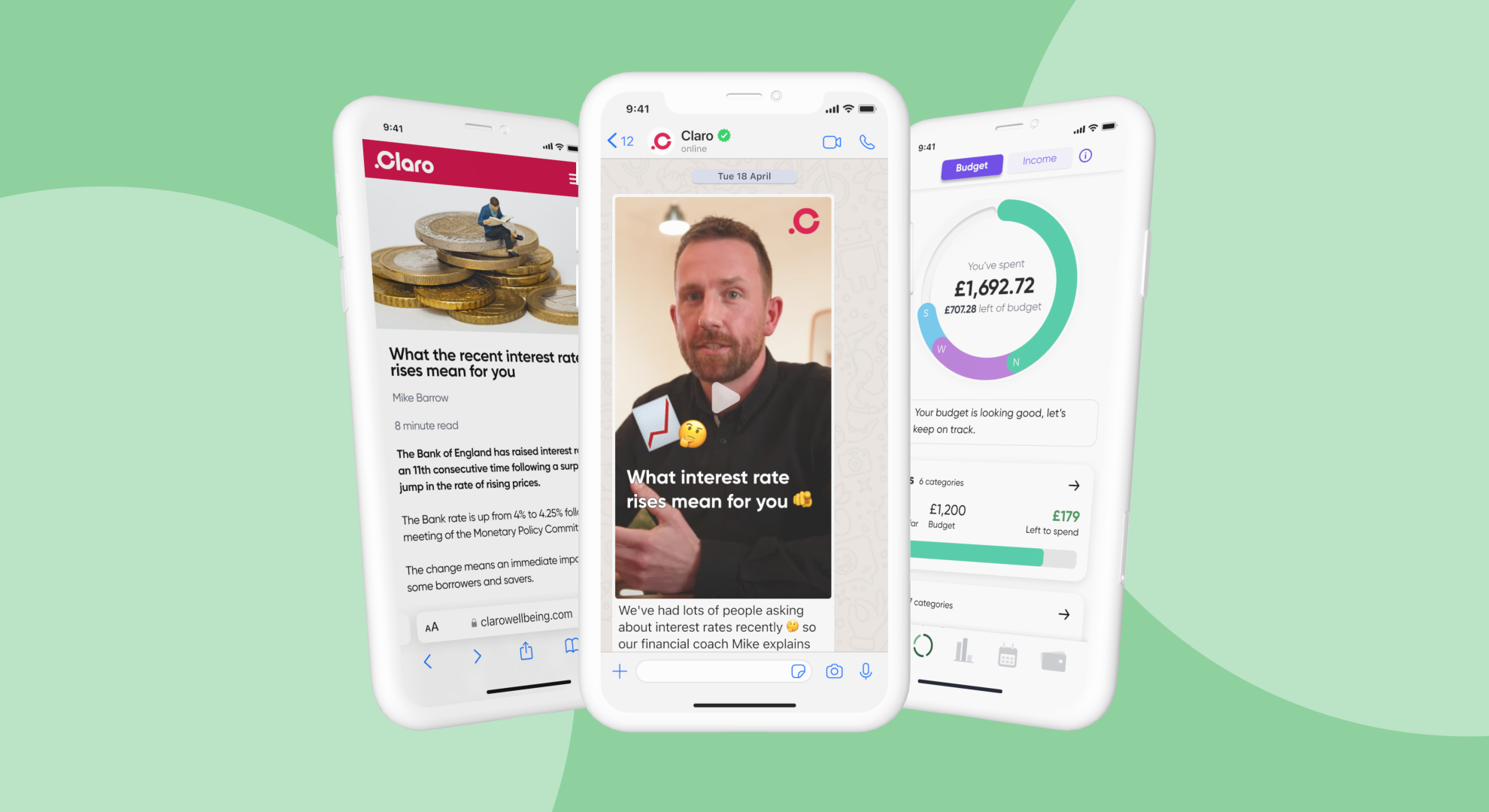6 min read
Should employers acknowledge Blue Monday?
Blue Monday (15 January) has a mixed reputation. But there’s still value in using the day to raise awareness of mental health and wellbeing...

The cost of living crisis is unfortunately ongoing, with the end still far from sight. It’s an issue that affects all aspects of everyday life, and the workplace is no exception. Financial stress and uncertainty can impact everything from mental health to day-to-day performance at work. A combination of openly acknowledging the economic turbulence and ensuring that your teams feel supported is the key to ensuring job satisfaction, good employer/employee relations and high levels of talent retention. But how can this be done from a HR perspective? And where do you even begin?
While this may not be a possibility for every organisation, it’s important to address the elephant in the room when you’re touching on the subject of providing assistance during the cost of living crisis. It’s inevitable that employees will query why certain means of support are being offered rather than simply upping salaries. If your company isn’t in a position to give a workforce-wide wage increase, be honest about it. Tell your staff that it’s something the organisation has taken into serious consideration and while it’s not feasible at present, you will continue to look into the matter and implement when it becomes financially viable. Reassure them that, in the meantime, the other means of support you are offering are aimed at helping with the rising cost of living.
Teams will always appreciate honesty over sugar-coating. By acknowledging the matter of wage increases first, you’re nipping that conversation in the bud from the outset and removing the potential for negativity towards whatever alternative means of support you offer. It’s an area you may need to address every so often, so don’t shy away from it.
An anonymous survey is the most powerful tool in every HR team’s arsenal. Particularly around sensitive topics like finances, people can be reluctant to offer up their views for fear of them being used in an illegitimate way, like influencing wage discussions. Bravery in text form often surmounts face-to-face interactions. Assuring your employees that their responses will be kept completely anonymous can go a long way in getting authentic answers and using that information to improve your offerings. Don’t be afraid to go into detail about the data collation methods to give extra peace of mind.
Draft specific questions with multiple-choice options or input text boxes geared around gauging how your employees are feeling about the current cost of living crisis. Ask them outright how they would like to be supported through this difficult time and you should receive some insightful answers. Where doable, implement ways to help your team through the most common areas of concern. For example, if a recurring theme is rising transport costs, look at relaxing the number of mandatory days in the office, or provide assistance with transport costs for those most vulnerable.
Whether it’s a frequent ‘lunch and learn’ series or a more relaxed ‘coffee and a chat’ for interested members of the team, a knowledge-share can take a lot of the formality out of structured sessions. Encourage knowledgeable members of the team to step forward and impart their wisdom to those less in-the-know to absorb during a lunchtime learning session. Perhaps a member of the accounting team has a go-to spreadsheet for monitoring personal monthly budgets, or someone from IT knows a great app for tracking your spending, maybe another person used to work as a mortgage advisor - use the resources that are available to you.
People are often more comfortable speaking to a peer and asking what they deem to be ‘silly questions’ as opposed to approaching an outsider who’s running a company-wide webinar with a rushed Q&A session at the end. Prompt employees to step forward with their relevant areas of expertise, no matter how niche, and get them to host a quick presentation with some tips and tricks to soften the impact of the rising cost of living and beyond.
Communicating the intention for this tactic is key, as it could be misconstrued as a means of clamping down on the act of doing some work-hours life admin. Rather, it’s an opportunity for employees to carve out some designated time in their week to get their most pressing financial matters tended to. Whether it’s setting up a direct debit, cancelling a subscription or shopping around for a more cost-effective internet provider, people can use the hour to set work aside and focus on their essential money matters that need some attention.
It’s an optional event, where teams simply join a video call and work away quietly by themselves. At the end, spend five minutes discussing the small wins that people have achieved. At Claro, we have Finance Fridays once a month, where those interested can do their financial tasks alongside the company of their colleagues for half an hour, or less. The uptake has been strong and the overall savings even stronger.
It’s a bit of a no-brainer, but in order to find out what your team really wants, you just need to ask them. While a consensus is always a good way to go, there may be a varied list of benefits that people would like to see incorporated into the package. Consider having people-specific benefits packages as opposed to a one-size-fits-all option. Get employees to communicate their individual wishes through their department heads, or send a survey (not anonymous this time) to gauge where the largest appetites lie.
While a bike to work scheme may benefit one person, a relaxed start time to aid child care logistics might be top of the list for another. Ask, listen and strategise, in that order. You won’t always please everyone, but people like to feel listened to. Negotiation is easier when everyone feels respected, considered and valued.
This is the easiest way to reach a lot of people in a relatively quick turnaround time. So long as the content is useful and concise, you should find it gets a decent open rate, and perhaps even some volunteers for article submissions. A monthly (or bimonthly, if you can) roundup of the latest goings-on in the world of finance will give your employees a good sense of where they stand in relation to rising interest rates, energy costs and income tax changes.
Pick a few topics that affect everyone and get your sharpest writers to rehash the information in an easily-digestible way - bonus points for adding some illustrations and infographics, too. Absorbing the ever-changing news can land you in a sea of negativity, so employees may welcome this need-to-know approach to financial matters. Draft in some expert commentary, ask for contributors and most importantly, keep it simple. The main aim is to do all the collating and hard work so your busy workers don’t have to. Browse the Claro Wellbeing website for some inspiration to help get you started.
Once you’ve sent a survey and implemented a couple of new strategies, it’s not quite time to sit back and stick on the kettle just yet. That’s just the beginning. Regular feedback is crucial when it comes to addressing the cost of living crisis in a way that helps your team. For as long as it continues, your communication needs to address the main issues facing employees. If you’re missing the mark, they’ll let you know. Pay attention to common themes that come up in feedback surveys.
If people are wondering why you’re ignoring the topic of mortgages, dedicate a ‘lunch and learn’ session to exactly that. If employees feel you’re talking too much about the negative things, add some lighter matters to the equation, or have a weekly roundup of positive things that have happened in the economy (if possible!). With the right amount of listening and action, you’ll soon have the appreciation of your employees and maybe even some brand new 5-star Glassdoor reviews!

6 min read
Blue Monday (15 January) has a mixed reputation. But there’s still value in using the day to raise awareness of mental health and wellbeing...

4 min read
Ever wished you had a money-whiz friend you could ask anything, as often as you like?

7 min read
Millions are being impacted by financial stress. Yet, until now, workers in frontline occupations have not been able to benefit from educational...